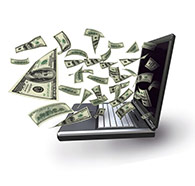НАВИГАЦИЯПОПУЛЯРНЫЕ СТАТЬИ
|
Our forecast still remains the same,” Vedev said. Talking about oil prices, Vedev expects a price of $90-110 per barrel in 2015-2017. 02.11.2014 12:44 U. S. Economy The Envy Of the World In the United States, the story of the economy is a good news, bad news affair. Jobs are coming back, but millions of people are reluctantly accepting part-time work. Investors are accumulating wealth, but income levels are hardly growing. But globally, the trajectory of America`s economy is spurring a different reaction: envy. On the heels of a steady six-month jobs expansion, the United States has reemerged as the star of - and perhaps the locomotive for - an otherwise slumping global economy. In the latest reminder of how America is outpacing much of the developed world, the government said Thursday that the nation`s gross domestic product - the size of its economy - grew at an annualized rate of 3.5 percent between July and September. That figure came as fears grow that Europe is sliding into its third recession since 2008. And although the United Kingdom is faring well, too, economists predict that by 2015, the United States will be the rich world`s standout economy. “GDP growth of 3.5 percent?” said Jay Bryson, a global economist at Wells Fargo. “If you said that to a European right now, they`d start to cry tears of joy.” 01.11.2014 21:06 Russian Ruble Falls Despite Rate Rise Not even a larger-than-expected rise in interest rates by Russia`s central bank could provide respite for the battered ruble on Friday, with the currency falling further against the dollar. The Bank of Russia surprised markets by raising interest rates by 1.5 percentage points, the largest hike since March, in an effort to provide support for the ruble and address rising consumer inflation. The ruble has hit record lows almost every day in October amid concerns about Russia`s economy. “This was a major move. This looked like what I call a financial-stability rate hike, with the intended goal of defending the ruble," said Benoit Anne, strategist at Societe Generale. However, after initially rising 1% against the U. S. dollar in response to the rate rise, the ruble soon fell back to trade just off 43 at 12:40 GMT, weaker than just before the announcement, suggesting that the weakness of the currency is rooted deep in the market. A euro was worth about 54 rubles, the weakest point for the currency on the day. Some analysts suggested that while the rate rise - which resulted in the key rate moving to 9.5% from 8% - together with a gas deal between Russia and Ukraine, could contribute toward stabilizing the ruble, more was needed. "To have a rally we need to see oil prices going up, or a significant improvement in the geopolitical backdrop," said Sebastien Barbe, head of emerging market strategy at Credit Agricole. "It`s a difficult balancing act for the central bank between stabilizing the economy and avoiding recession. When your economy is barely growing, interest rates at 9.5% look very odd," he added. "This decision is purely negative for Russian economic growth prospects. However, the central bank hints that it might be a short-term tightening, until situation with ruble becomes better," said Oleg Kouzmin, economist at Renaissance Capital. 30.10.2014 12:17 Russian Defense Budget to Hit Record $81 Billion in 2015 Russia`s national defense budget for next year will reach a record 3.3 trillion rubles ($81 billion), or 4.2 percent of the country`s GDP, the head of the State Duma`s defense committee, Admiral Vladimir Komoyedov, was quoted as saying by the Interfax news agency. The 2015 budget represents an 812 billion ruble ($20 billion) increase over this year, and portends a larger defense budget over the next several years. Russia`s GDP this year is forecast at just over $2 trillion, according to the World Bank, and Russia`s Finance Ministry expects it to grow by a mere 1 percent in 2015, state news agency TASS reported. According to Komoyedov, the Duma plans to spend 3.1 trillion rubles ($76 billion), or 3.7 percent of GDP, on defense in 2016 and 3.23 trillion ($79 billion), or 3.6 percent of GDP, in 2017. "These parameters are significantly higher than in 2014, when the proportion of GDP was 3.4 percent," Komoyedov was quoted as saying by Interfax. Last year, defense expenditures made up 3.2 percent of GDP, and were a mere 3 percent in 2012. With the exception of the United States, which spent 3.8 percent of its GDP on defense in 2013, most of the world`s countries spend less than 3 percent of their GDP on their militaries, according to World Bank data. In general, U. S. defense expenditures measured in percentage of GDP have been falling sine 2010, when spending reached 4.7 percent of GDP. However, World Bank data paints an even more drastic picture of Russia`s recent defense spending than Komoyedov did. Last year the World Bank said Russia`s defense budget was already 4.2 percent of its GDP. 27.10.2014 17:42 Financial Times: new G7, including Russia, emerges The International Monetary Fund released its latest World Economic Outlook. A striking new finding emerges: the seven largest emerging markets are now bigger, in gross domestic product terms, than the long established G7 group of industrialized nations, when measured at purchasing power parity (PPP), the British daily said. A hypothetical new G7, comprising the BRICs Brazil, Russia, India and China and three of the so-called MINT economies Mexico, Indonesia and Turkey - has a combined GDP of $37.8 tn (at purchasing power parity) compared to $34,5 tn for the old G7 Canada, France, Germany, Italy, Japan, the UK and the US. The new attempts to measure GDP also confirm that, in PPP terms, China is now the world`s largest economy, overtaking the US (as revealed by the FT in April). At market exchange rates, the US economy is worth $17, 4 tn and the Chinese $10.4 tn. With an adjustment for relative prices, China`s economy moves up to first place, with a GDP of $17.6 tn. Russia is the sixth among the new top 10, ahead of France and the UK. "The new estimates point to a dramatically changed world: half of the twenty largest economies are now emerging markets and half are from the established rich world," the Financial Times said. 26.10.2014 12:44 Is Russia Heading for a New 1998 Crisis? Not since the financial crisis of August 1998 has Russia faced the very real possibility of a currency crisis that could seriously threaten the fundamental stability of the country`s economic and political system. Though the ruble`s loss of 20 percent of its value this year falls well short of the 70 percent collapse in 1998 and is even lower — in relative terms — than the 30 percent decline experienced in 2008, there are key parallels between the 1998 crisis and the crisis developing in Russia today. Both Russia`s leaders and citizens would do well to remember the lessons of August 1998 as they face the coming storm. First, the country`s economic trajectory was put in a tailspin once again, with Russians` real wages falling to their lowest level in the post-Soviet era. Russia`s economy would recover only with the rebound in oil prices during the ensuing decade. There is no guarantee that Russia can count on such fortune today, and the full economic costs of Russia`s current confrontation with the West remain to be seen. However they tally, they will be steep. Second, the 1998 crisis was a watershed moment in Russia`s political development. The people of Russia, beaten down by years of economic trauma and failed reforms, were ready by 1998 for anyone but Yeltsin. Russians demanded anyone who could restore order and stability to Russia`s economic and political system; Russians demanded the anti-Yeltsin. August 1998 set the stage for the rise of Vladimir Putin, the anti-Yeltsin. Should the vicious cycle of economic crisis grip Russia once again, we can only imagine what kind of "anti-Putin" could rise from the ruins. 25.10.2014 15:53 Russia`s Economy Stalls Amid Western Sanctions, Oil Price Drop Russia`s economy - battered by Western sanctions and falling prices for oil, its main export - stalled in September even as inflation hit the highest levels in months, data showed. The outlook appears dim, because officials said the surge in inflation is likely to force the central bank to further increase interest rates in the coming months. The inflation was fueled in part by Moscow`s move in August to ban food imports from Western countries that had imposed sanctions on Russia. The ruble, meanwhile, has slipped to record lows against the dollar and euro in recent weeks amid concerns about geopolitical tensions and falling oil prices. The currency drop has also contributed to inflation by boosting prices for imported goods. The State Statistics Service reported that consumer price inflation reached an annual rate of 8.3% in the third week of October, the highest level this year, driven by a rise in food prices. The central bank has intervened heavily this month to slow the ruble`s slide. The Finance Ministry announced it would soon begin offering foreign-currency deposits to banks in an effort to ease a shortage of dollars and euros on the market. Economy Minister Alexei Ulyukaev said GDP growth in the first nine months of this year was 0.7%, unchanged from the rate reported for the first eight months of the year, Russian news agencies reported Wednesday. That result would keep Russia`s economy on track for its weakest performance since the recession of 2009. Though Mr. Ulyukaev didn`t provide monthly figures, the latest result suggests that the economy stagnated or even contracted in September from the month before. In September 2013, GDP contracted 0.1% from the previous month. The government`s forecast calls for growth of 0.5% this year, down from 1.3% in 2013, but many economists expect the 2014 result to be weaker. 23.10.2014 12:29 Ukraine GDP to shrink 8% this year Ukraine`s economy is likely to suffer more than previously predicted because of the conflict in the east of the country, the World Bank has said. It now says that GDP is likely to contract by 8% this year, compared with its previous prediction of 5%. It also now expects a 1% contraction in 2015, instead of 2.5% growth. The World Bank said the conflict had caused disruption in economic activity in the eastern Donetsk and Luhansk regions, leading to a sharper decline in GDP. The bank`s chief representative in Ukraine, Qimiao Fan, said the two regions accounted for about one-sixth of the country`s GDP, including a quarter of industrial output. The fall of Ukraine`s GDP in 2014 could reach 8-9% against the background of the aggressors` destructing industrial infrastructure in the east of the country, Finance Minister Oleksandr Shlapak has said. According to the minister, this situation affects the balance of payments: enterprises in the east of the country provided 30% of the country`s foreign exchange earnings. In addition, the balance of payments is under pressure due to Moscow`s restricting Ukrainian imports. "We will see a shortage of export resources to the tune of about $5 billion because of the conflict with Russia. But basically, the situation with the currency balance is getting worse. And here the National Bank takes the fall," Shlapak said. 22.10.2014 15:22 Five known unknowns about the future of the global economy Since it seems Daniel Dresna has written the Book of the Week this week on the global economy, it`s apropos to think a little more about the future. Over the past week economists have been debating whether Thomas Piketty`s r > g argument is kicking in yet. And as Robert Shiller noted this weekend, there`s an awful lot of loose talk about secular stagnation these days. As someone who`s paid to think about the future of the global political economy, Dresna`d humbly suggest that the big known unknowns about the future of the global economy probably are not attracting a lot of scholarly chatter precisely because of the massive number of unknown parameters. When people think about, say, the next 30 years of the global economy, they`re trying to marry a few deeply known ideas with some deep questions about the implications of those deeply known facts of life for the future. There`s another reason, however: a lot of the big questions are being asked by non-economists. Precisely because economists start off with a lot of baked-in assumptions. it doesn`t always occur to them that these assumptions might not hold up. Dresna has observed top five known unknowns about the future of the global economy. Each unknown is named after the two authors largely responsible for planting the idea in my head. Half of these people are economists; the other half are outside the field but asking very interesting questions. 16.10.2014 14:36 Will Cheap Oil Choke the Russian Economy? Among the many threats facing Russia`s economy, cheap oil could be the biggest of all. Crude prices have fallen more than 23 percent since June, depressing the ruble and knocking a potentially gaping hole in the national budget, which draws 45 percent of revenues from oil taxes. The Kremlin warned that it will have to dig deeply into reserves if oil prices and the ruble exchange rate remain at current levels. Covering budget shortfalls over the next three years could deplete half of a $74 billion reserve fund the government created to guard against energy price fluctuations. Russia`s draft budget for 2015 is based on $100-a-barrel oil, but crude is now trading at about $88, the lowest since December 2010. Oil prices, not Western sanctions, are what`s driving the currency`s sharp decline, analysts say. “The value of the ruble stayed relatively calm through the summer, even as sanctions were being ratcheted up,” Chris Weafer of Moscow consultancy Macro Advisory wrote in the Moscow Times. “Since early August, the ruble has fallen 9 percent against the dollar-euro basket, almost exactly mirroring the 8 percent decline in the price of crude oil over the same period. ” The ruble, he said, “is behaving as a petro-currency.” And it`s still falling: Despite $6 billion in interventions by the central bank over the past two weeks, the ruble declined again on October 15th, to more than 41 against the dollar. Because of Russia`s outsize dependence on oil and gas, which account for more than two-thirds of its exports, lower energy prices can easily tip its $2 trillion economy into recession. “Growth is likely to remain positive only with oil prices above $92 to $93 a barrel,” says economist Charles Robertson of Renaissance Capital. At $90 a barrel, the economy would contract 0.4 percent next year, and at $80 a barrel it would shrink 1.7 percent, he predicts. |
Цитата дняБольшинство людей начинают интересоваться акциями, когда все остальные интересуются. Время интересоваться — это когда никто другой не интересуется. Вы не можете купить что-либо популярное и выиграть от этого. |




 03.11.2014 13:42 Russia growth up to 1.1% in September from zero Russia`s GDP growth accelerated to 1.1 percent last month which marked an economic revival from the flat growth last year, the Ministry of Economic Development has said. In month-to-month terms, Russia`s GDP grew 0.4 percent in September, marking a turnaround from the decline a month earlier, Oleg Zasov, head of the Macroeconomic Forecasting Department of the Russian Ministry of Economic Development, said. The optimistic figures come at a time when the Russian economy is being hit by falling oil prices and a cheapening ruble. Between January and September Russia`s GDP increased 0.8 percent, in the third quarter it grew by 0.7 percent, Aleksey Vedev, deputy head of Russia’s Ministry for Economic Development, told TASS. "The results of the third quarter are satisfying,” he said, “Given the fact that there was a high base in the fourth quarter of 2013, the forecast growth of 0.5 percent seems to be an achievable goal. And with optimistic circumstances it may be even higher," he concluded. On a less positive note, real disposable income and investment in Russia fell, as the ruble kept on losing value against the US Dollar. Projections for the capital outflow this year remain at $100 billion. "The planned revision of the forecast is appointed for December 1, now we are making preliminary calculations and collecting data.
03.11.2014 13:42 Russia growth up to 1.1% in September from zero Russia`s GDP growth accelerated to 1.1 percent last month which marked an economic revival from the flat growth last year, the Ministry of Economic Development has said. In month-to-month terms, Russia`s GDP grew 0.4 percent in September, marking a turnaround from the decline a month earlier, Oleg Zasov, head of the Macroeconomic Forecasting Department of the Russian Ministry of Economic Development, said. The optimistic figures come at a time when the Russian economy is being hit by falling oil prices and a cheapening ruble. Between January and September Russia`s GDP increased 0.8 percent, in the third quarter it grew by 0.7 percent, Aleksey Vedev, deputy head of Russia’s Ministry for Economic Development, told TASS. "The results of the third quarter are satisfying,” he said, “Given the fact that there was a high base in the fourth quarter of 2013, the forecast growth of 0.5 percent seems to be an achievable goal. And with optimistic circumstances it may be even higher," he concluded. On a less positive note, real disposable income and investment in Russia fell, as the ruble kept on losing value against the US Dollar. Projections for the capital outflow this year remain at $100 billion. "The planned revision of the forecast is appointed for December 1, now we are making preliminary calculations and collecting data. Автор:
Автор: 
 Комментарии: 0
Комментарии: 0 Просмотров: 29
Просмотров: 29


